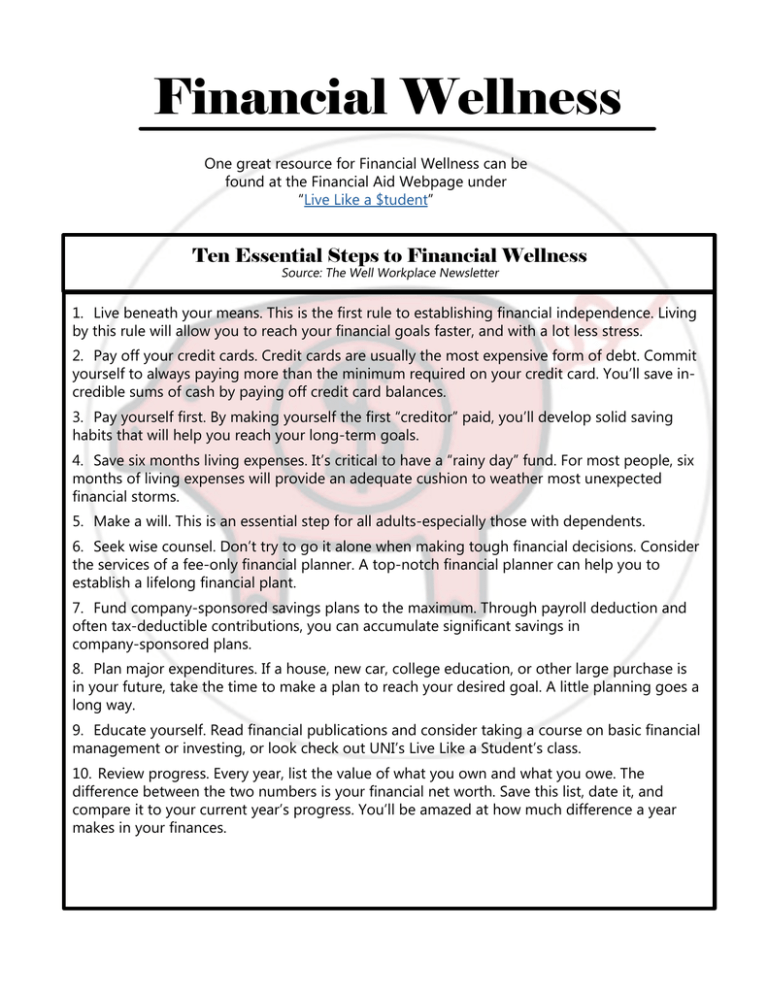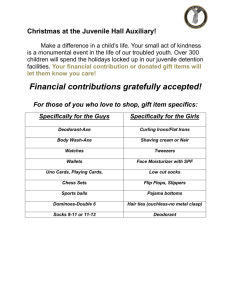Financial Wellness Ten Essential Steps to Financial Wellness
advertisement

Financial Wellness One great resource for Financial Wellness can be found at the Financial Aid Webpage under “Live Like a $tudent” Ten Essential Steps to Financial Wellness Source: The Well Workplace Newsletter 1. Live beneath your means. This is the first rule to establishing financial independence. Living by this rule will allow you to reach your financial goals faster, and with a lot less stress. 2. Pay off your credit cards. Credit cards are usually the most expensive form of debt. Commit yourself to always paying more than the minimum required on your credit card. You’ll save incredible sums of cash by paying off credit card balances. 3. Pay yourself first. By making yourself the first “creditor” paid, you’ll develop solid saving habits that will help you reach your long-term goals. 4. Save six months living expenses. It’s critical to have a “rainy day” fund. For most people, six months of living expenses will provide an adequate cushion to weather most unexpected financial storms. 5. Make a will. This is an essential step for all adults-especially those with dependents. 6. Seek wise counsel. Don’t try to go it alone when making tough financial decisions. Consider the services of a fee-only financial planner. A top-notch financial planner can help you to establish a lifelong financial plant. 7. Fund company-sponsored savings plans to the maximum. Through payroll deduction and often tax-deductible contributions, you can accumulate significant savings in company-sponsored plans. 8. Plan major expenditures. If a house, new car, college education, or other large purchase is in your future, take the time to make a plan to reach your desired goal. A little planning goes a long way. 9. Educate yourself. Read financial publications and consider taking a course on basic financial management or investing, or look check out UNI’s Live Like a Student’s class. 10. Review progress. Every year, list the value of what you own and what you owe. The difference between the two numbers is your financial net worth. Save this list, date it, and compare it to your current year’s progress. You’ll be amazed at how much difference a year makes in your finances. Gift Giving Damage Control Source: Healthy YoUniverse It’s easy to frivolously overspend during the holidays. But if you were still paying for holiday gifts last summer, maybe you should try doing things differently. Here are some helpful hints: 1.Budget. Decide how much you can afford to spend, and how many gifts you want to give. Then stick to it. 2.Give everyone the same gift. Find a bargain and buy many! Everyone gets a subscription to a magazine, your favorite CD, a pretty candle, or ornament. 3.Give families one gift to share. A great game, a globe or atlas or a puzzle can replace individual gifts. 4.Get cooking! Homemade foods are enjoyed and remembered longer than most presents. 5.Agree to cut back. Decide on smaller gifts with your spouse, relatives or friends. Set a price limit or decide not to exchange gifts in some cases. Let the kids know that the family will be cutting back, too. 6.Make gift certificates. Give your spouse or friends a day of baby-sitting. Give grandparents snow-shoveling services and children a winter trip to the children’s museum or zoo. They’ll love it! Spending Tips Source: Tahira Hara, Iowa State University Professor of Personal Finance and Consumer Economics, August 2009 • • • • • • Give yourself a daily allowance that fits within the budget, so once that amount is spent, you know you have to stop spending for that day. Balance your checkbook regularly, even if you are doing your banking on the internet. Keep credit cards safe at home; don’t have them on you every day. Studies show people with credit cards are more likely to spend beyond their means, or lose control. Keep credit cards for emergency needs or take them with you when traveling. When going out with friends at night, decide ahead of time how much money you can afford to spend that evening. Just take that much money and leave the rest behind. Eliminate or minimize casual visits to the mall. Only go there when you have something specific to buy. Buy that item and then leave. When you want to relax, reduce stress, or celebrate, realize that there are better ways to deal with emotions than shopping. Go for a walk, read a fun book, visit with friends or family, or volunteer your time to someone in need through community service. Take the Debt Check Quiz Source: Mayo HealthQuest Which statements are true for you? • • • • • I charge up to the limit on my credit cards. I skip a bill payment some months. I make only the minimum payments on credit cards. I’m usually late with bill payments. Even one check mark can mean that you’re knee-deep in debt. What to do? Know how much you spend. Write checks for your expenses and keep a detailed register. Be aware of why you spend. Spending to comfort yourself may be only a temporary fix. Lose the frills. Before you buy, ask if you really need it. Maintain a budget. Avoid “credit repair companies” who offer to clean up your credit report for a fee. There’s only one way to do that kind of repair: pay off your debts. Tip: Don’t give yourself credit! Give yourself some “cooling off” time. Wait at least 24 to 48 hours before buying anything on credit. A Person Who is Financially Well Source: UC San Diego Wellness Center • • • • • • Develops a balanced budget that manages both income and expenditures. Is knowledgeable about the ways to receive scholarships, loans, and grants for school. Has one credit card or no credit cards. Makes good consumer choices. Focuses on saving money instead of spending money. Plans and prepares to deal with all expenses (living, school, short-term, long-term, emergencies). Websites Worth Checking Out Feed the Pig National Council on Problem Gambling

